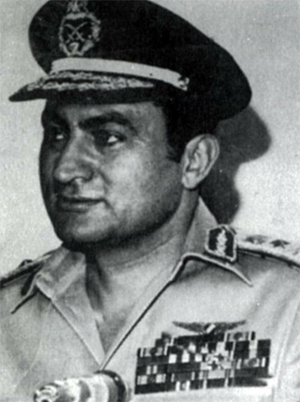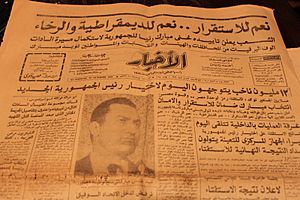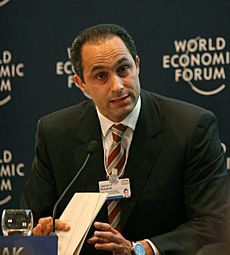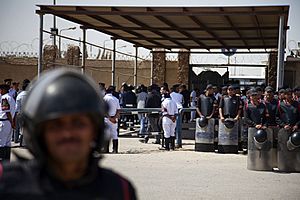Hosni Mubarak facts for kids
Quick facts for kids
Hosni Mubarak
|
|
|---|---|
|
حسني مبارك
|
|
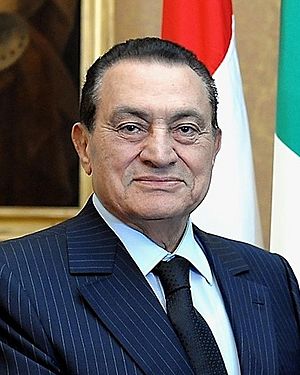
Mubarak during a visit to Rome, 2009
|
|
| 4th President of Egypt | |
| In office 14 October 1981 – 11 February 2011 |
|
| Prime Minister |
See list
Himself (1981–1982)
Ahmad Fuad Mohieddin (1982–1984) Kamal Hassan Ali (1984–1985) Aly Lotfy Mahmoud (1985–1986) Atef Sedky (1986–1996) Kamal Ganzouri (1996–1999) Atef Ebeid (1999–2004) Ahmed Nazif (2004–2011) Ahmed Shafik (2011) |
| Vice President |
|
| Preceded by |
|
| Succeeded by |
|
| Prime Minister of Egypt | |
| In office 7 October 1981 – 2 January 1982 |
|
| President |
|
| Preceded by | Anwar Sadat |
| Succeeded by | Ahmad Fuad Mohieddin |
| Vice-President of Egypt | |
| In office 16 April 1975 – 14 October 1981 |
|
| President | Anwar Sadat |
| Preceded by |
|
| Succeeded by | Omar Suleiman |
| Secretary-General of the Non-Aligned Movement | |
| In office 16 July 2009 – 11 February 2011 |
|
| Preceded by | Raúl Castro |
| Succeeded by | Mohamed Hussein Tantawi (acting) |
| Commander of the Air Force | |
| In office 23 April 1972 – 16 April 1975 |
|
| President | Anwar Sadat |
| Preceded by | Ali Mustafa Baghdady |
| Succeeded by | Mahmoud Shaker |
| Director of the Egyptian Air Academy | |
| In office November 1967 – June 1969 |
|
| Preceded by | Yahia Saleh Al-Aidaros |
| Succeeded by | Mahmoud Shaker |
| Personal details | |
| Born |
Muhammad Hosni El Sayed Mubarak
4 May 1928 Kafr-El Meselha, Kingdom of Egypt |
| Died | 25 February 2020 (aged 91) Cairo, Egypt |
| Political party | NDP (1978–2011) |
| Spouse |
Suzanne Thabet
(m. 1959) |
| Children |
|
| Alma mater |
|
| Signature | |
| Military service | |
| Branch/service | Egyptian Air Force |
| Years of service | 1950–1975 |
| Rank | Air chief marshal |
| Commands |
|
|
|
Muhammad Hosni El Sayed Mubarak (born May 4, 1928 – died February 25, 2020) was an important Egyptian leader. He served as the fourth president of Egypt from 1981 to 2011.
Before becoming a politician, Mubarak was an officer in the Egyptian Air Force. He was its commander from 1972 to 1975. He reached the high rank of air chief marshal in 1973. In 1975, President Anwar Sadat chose him as vice president. Mubarak became president after Sadat's death in 1981.
Mubarak was president for nearly 30 years. This made him Egypt's longest-serving leader since Muhammad Ali Pasha. Pasha ruled Egypt for 43 years, from 1805 to 1848.
Mubarak quickly became president in 1981 after President Sadat's death. He won elections again in 1987, 1993, and 1999. In these elections, he was the only candidate. In 2005, under pressure from the United States, Egypt held its first election with multiple candidates. Mubarak won this election too.
In 1989, he helped Egypt rejoin the Arab League. Egypt's membership had been paused because of a peace agreement with Israel. Mubarak was known for supporting peace talks between Israel and Palestine. He also played a role in the Gulf War.
However, his rule was very strict. A special law, in place since 1967, limited people's freedoms and political groups. Security forces were very strict, and there were many reports of corruption.
Mubarak left power during big protests in Egypt in 2011. These protests lasted for 18 days. On February 11, 2011, Vice President Omar Suleiman announced that Mubarak had resigned. Power was then given to the Supreme Council of the Armed Forces.
On April 13, 2011, a prosecutor ordered Mubarak and his two sons, Alaa and Gamal, to be held for questioning. This was about claims of corruption and misusing his power. Mubarak later faced a trial for not stopping the killing of peaceful protesters during the revolution. These trials started on August 3, 2011. This made him the first Arab leader to be tried in his own country's regular court.
On June 2, 2012, an Egyptian court gave Mubarak a life sentence in prison. After this, he had several health problems. On January 13, 2013, Egypt's highest appeals court cancelled his sentence and ordered a new trial. In the new trial, Mubarak and his sons were found guilty of corruption on May 9, 2015, and sent to prison. Mubarak stayed in a military hospital, while his sons were freed on October 12, 2015. Mubarak was found not guilty on March 2, 2017, and was released on March 24, 2017.
Mubarak died in 2020 at age 91. He had a special funeral held by the country and was buried in a family plot near Cairo.
Contents
Early Life and Education
Hosni Mubarak was born on May 4, 1928, in Kafr El-Meselha, Monufia Governorate, Egypt. In 1949, he left the Military Academy. He then joined the Air Force Academy. He became a pilot officer in 1950 and earned a degree in aviation sciences.
Air Force Career
Mubarak served as an officer in the Egyptian Air Force in many different groups. He spent two years in a Spitfire fighter squadron. In the 1950s, he returned to the Air Force Academy as a teacher. He stayed there until 1959.
From 1959 to 1961, Mubarak trained more in the Soviet Union. He went to a Soviet pilot training school in Moscow. He also trained at Kant Air Base near Bishkek.
Mubarak learned to fly Ilyushin Il-28 and Tupolev Tu-16 jet bombers. In 1964, he attended the Frunze Military Academy in Moscow. When he returned to Egypt, he became a wing commander. Then he became a base commander. He commanded the Cairo West Air Base in 1966. He also briefly commanded the Beni Suef Air Base.
In November 1967, Mubarak became the commander of the Air Force Academy. He was praised for doubling the number of Air Force pilots and navigators before the October War. Two years later, he became the Chief of Staff for the Egyptian Air Force.
In 1972, Mubarak became the Commander of the Air Force. He also became the Egyptian Deputy Minister of Defense. On October 6, 1973, when the Yom Kippur War started, the Egyptian Air Force launched a surprise attack. They attacked Israeli soldiers on the east bank of the Suez Canal. Egyptian pilots hit most of their targets. This made Mubarak a national hero. The next year, he was promoted to Air Chief Marshal. This was in recognition of his service during the October War of 1973 against Israel.
Some people said Mubarak helped Egypt's strong start in the war. However, others disagreed. Shahdan El-Shazli, whose father was the former Egyptian military Chief of Staff, said Mubarak changed documents. She claimed he took credit from her father for the early success of Egyptian forces. She also said photos from the military command room were changed. She said her father was removed and Mubarak was put in his place.
Vice President of Egypt
In April 1975, President Anwar Sadat chose Mubarak as Vice President of Egypt. In this role, he took part in government talks. These talks were about future agreements with Israel. In September 1975, Mubarak went to Riyadh and Damascus. He tried to convince Saudi Arabia and Syria to accept a peace agreement with Israel. But the Syrian President refused to meet him.
During his meetings with the Saudi government, Mubarak became friends with Crown Prince Fahd. Sadat had refused to meet Fahd. But Fahd was now seen as important for fixing the relationship between Egypt and Saudi Arabia. Mubarak also became friends with other important Arab leaders. These included Saudi Foreign Minister Prince Saud and Oman's Sultan Qaboos.
Sadat also sent Mubarak to many meetings with foreign leaders outside the Arab world. Mubarak's importance as Vice President was clear. A US Ambassador was told that Mubarak would likely be in all important meetings. He was advised not to upset Mubarak because he was Sadat's personal choice. Mubarak supported Sadat's efforts to get the Sinai Peninsula back for Egypt. However, he agreed with other Arab leaders who opposed the Camp David Accords. They felt it did not solve other problems in the Arab–Israeli conflict. Sadat even gave his decision-making power to Mubarak when he went on vacation.
President of Egypt
Mubarak was hurt when President Sadat was killed in October 1981. After Sadat's death, Mubarak became the fourth president of Egypt.
Egypt's Return to the Arab League
Egypt was the only country in the Arab League whose membership was stopped. This happened because President Sadat signed a peace treaty with Israel. In June 1982, Mubarak met with King Fahd of Saudi Arabia. This meeting started to improve relations between Egypt and Saudi Arabia. Egypt is the largest Arab country, and Saudi Arabia is the richest. So, their alliance was very strong in the Arab world.
At an Arab League meeting in 1982, Saudi Arabia suggested a peace plan. If Israel allowed a Palestinian state, all Arab countries would make peace with Israel.
During the Iran–Iraq War (1980-1988), Egypt helped Iraq with military support and money. One million Egyptians worked in Iraq to replace Iraqi men fighting in the war. In December 1983, Mubarak welcomed Yasser Arafat of the PLO to a meeting in Cairo. This improved relations with the PLO. From then on, Egypt became the PLO's main ally.
In 1989, Egypt was allowed back as a full member of the Arab League. The League's main office moved back to its original location in Cairo.
Governing Style
In the 1980s, Mubarak worked to increase affordable housing, clothing, furniture, and medicine. When he became president, Mubarak was one of the few Egyptian officials who did not visit Israel. He promised to be less eager to normalize relations with Israel. Under Mubarak, Israeli journalists often wrote about the "cold peace" with Egypt. They noted that relations were not very friendly.
Egypt relied heavily on aid from the United States. It also hoped the US would pressure Israel for a Palestinian agreement. Mubarak also quietly improved relations with the former Soviet Union. In 1987, Mubarak won an election for his second six-year term.
In his early years, Mubarak expanded Egypt's security forces. He focused a lot on security. This might have been because he saw his predecessor killed right in front of him. He often sought advice from his security chiefs. Human rights groups said that security services in Egypt often violated human rights. The government remained very large, employing many people.
Mubarak was targeted in several assassination attempts. This was because of his views against some Islamic groups and his peace efforts with Israel. The BBC reported that Mubarak survived six attempts on his life.
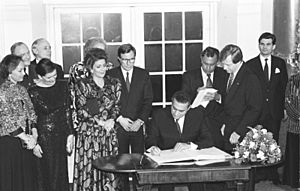
Gulf War of 1991
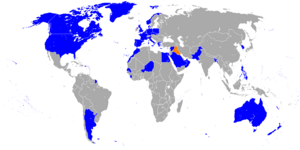
Egypt was part of the group of countries that fought in the 1991 Gulf War. Egyptian soldiers were among the first to arrive in Saudi Arabia to remove Iraqi forces from Kuwait. Egypt's involvement in the war made its role in the Arab World stronger. It also brought financial benefits to the Egyptian government. News reports said Egypt received up to $20 billion in debt forgiveness.
Stance on the 2003 Invasion of Iraq
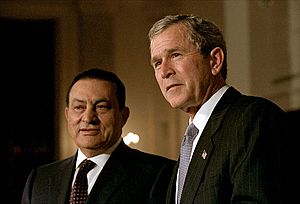
President Mubarak spoke against the 2003 invasion of Iraq. He argued that the Israeli–Palestinian conflict should have been solved first. He also said the war would cause "100 Bin Ladens". However, as President, he did not support an immediate US withdrawal from Iraq. He believed it would likely lead to chaos.
2005 Elections
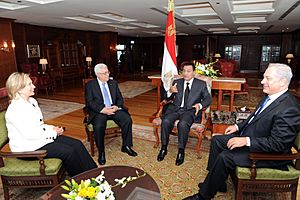
President Mubarak was re-elected many times in referendums in 1987, 1993, and 1999. Each time, he was nominated by Parliament and then confirmed without opposition.
The September 2005 election had multiple candidates, not just one. However, the election system and security forces were still controlled by the President. On July 28, 2005, Mubarak announced he would run for president. The election was on September 7, 2005. Groups that watched the election said it had many problems with unfair practices.
Concerns about Corruption
While Mubarak was in office, reports of corruption in the government increased. Political figures and young activists were sometimes put in prison without a trial. There were also reports of secret detention places. Universities, mosques, and newspapers sometimes faced problems because of their political views.
In 2005, Freedom House, a group that studies democracy, reported that Egypt's government under Mubarak added many rules. These rules often led to corruption. Freedom House said, "corruption remained a significant problem under Mubarak, who promised to do much, but in fact never did anything significant to tackle it effectively."
In 2010, a report by Transparency International ranked Egypt 98th out of 178 countries for how much corruption people perceived. A score of 10 means very clean, and 0 means very corrupt. Egypt scored 3.1.
Wealth and Claims of Personal Corruption
In February 2011, ABC News reported that experts believed Mubarak and his family had between $40 billion and $70 billion. This money was said to come from military contracts during his time as an air force officer. The Guardian newspaper also reported that Mubarak and his family might be worth up to $70 billion. This money was said to come from corruption, bribes, and legal business activities. The money was reportedly in various bank accounts, including some in Switzerland and the UK. It was also invested in foreign property. However, Newsweek said these claims were not well supported.
On February 12, 2011, the government of Switzerland announced it was freezing the Swiss bank accounts of Mubarak and his family. On February 20, 2011, Egypt's Prosecutor General ordered Mubarak's assets frozen. This included assets of his wife, Suzanne, his sons Alaa and Gamal, and his daughters-in-law. The Prosecutor General also asked other countries to freeze any assets Mubarak and his family might have there.
On May 21, 2014, a court in Cairo found Mubarak and his sons guilty of taking about $17.6 million of state money. This money was meant for renovating presidential palaces but was used to upgrade private family homes instead. The court ordered them to repay the money. Mubarak was sentenced to three years in prison, and his sons to four years.
Presidential Succession
Mubarak's political party had said he would be their only candidate for the 2011 Presidential Election. On February 1, 2011, Mubarak said he would not run in the 2011 election. When this did not stop the protests, Mubarak's vice president said that Gamal Mubarak would not run for president either. As protests grew and Mubarak left power, some believed Gamal Mubarak had planned to become president.
Israeli–Palestinian Conflict
During his time as president, Mubarak supported the peace treaty between Egypt and Israel from 1978. This treaty was arranged by the U.S. Mubarak sometimes hosted meetings about the Israeli-Palestinian conflict. He tried to help both sides reach an agreement.
In October 2000, Mubarak hosted a special meeting in Sharm el-Sheikh to discuss the conflict. Many leaders attended, including U.S. President Bill Clinton and Israeli Prime Minister Ehud Barak.
Mubarak was involved in the Arab League. He supported Arab efforts to find lasting peace in the region. In 2002, the Arab League adopted the Arab Peace Initiative. This plan aimed to end the Arab–Israeli conflict.
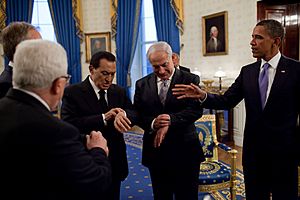
In 2006, Mubarak spoke against the Israeli military attack in Lebanon. But he also criticized Hezbollah for harming Arab interests.
In June 2007, Mubarak held a meeting in Sharm el-Sheik with leaders from Jordan, Palestine, and Israel. On June 19, 2008, a ceasefire between Israel and Hamas, arranged by Egypt, began. However, neither side fully followed the agreement.
The agreement required Hamas to stop rocket attacks on Israel. In return, Hamas expected the blockade on Gaza to end. Israel linked easing the blockade to fewer rocket attacks. They gradually reopened supply lines to Gaza.
Revolution and Overthrow
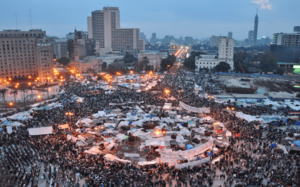
Protests against Mubarak and his government started in Cairo and other Egyptian cities in January 2011. On February 1, Mubarak announced he would not run in the presidential election in September. He also promised to change the constitution. This did not satisfy most protesters, who wanted Mubarak to leave immediately. The protests continued. On February 2, there were violent clashes between people who supported Mubarak and those who opposed him.
On February 10, Mubarak said he would not resign until the September election. However, he said he would give responsibilities to Vice President Omar Suleiman. The next day, Suleiman announced that Mubarak had resigned. This news brought cheers and celebrations from protesters in Egypt.
Protests
On January 25, 2011, protests against Mubarak and his government began in Cairo and across Egypt. People called for Mubarak to resign. Mubarak said in a speech that he would not leave and would die on Egyptian soil. Opposition leader Mohamed ElBaradei called Mubarak's words a trick to stay in power.
On February 1, 2011, Mubarak announced on TV that he would not seek re-election. He said he wanted to finish his current term and promised changes to the constitution. This compromise was not enough for the protesters. Violent demonstrations happened in front of the Presidential Palace. On February 11, Vice President Omar Suleiman announced Mubarak had resigned. Power was then given to the Egyptian military.
Soon after Mubarak's resignation, an Egyptian military member thanked Mubarak for "putting the interests of the country first." The statement said the military council was "studying the situation" but did not say what they would do next.
Life After Resignation
Mubarak did not appear in the media after he resigned. Except for his family and a few close helpers, he reportedly refused to talk to anyone. His health was said to be getting worse. Some reports said he was in a coma. Most sources said he was no longer interested in doing anything and wanted to "die in Sharm El-Sheikh."
On February 28, 2011, Egypt's General Prosecutor ordered Mubarak and his family not to leave Egypt. It was reported that Mubarak was talking to his lawyer about possible criminal charges. As a result, Mubarak and his family were placed under house arrest at a presidential palace. This palace was in the Red Sea resort of Sharm el-Sheikh. On April 13, 2011, a prosecutor ordered Mubarak and his sons to be held for questioning. This was about claims of corruption and misusing power. His sons were jailed. State television reported that Mubarak was in police custody in a hospital after a heart attack.
On May 11, 2013, Mubarak gave his first interview since resigning. He told El-Watan, "History will judge and I am still certain that the coming generations will view me fairly." He also said that President Mohammed Morsi faced a tough time.
Trials
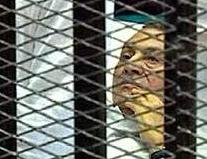
On May 24, 2011, Mubarak was ordered to stand trial. The charges included planning the killing of peaceful protesters during the revolution. If found guilty, he could face the death penalty. The full list of charges included "intentional murder, attempted killing of some demonstrators... misuse of influence, deliberately wasting public funds and unlawfully making private financial gains and profits."
On May 28, a Cairo court found Mubarak guilty of harming the national economy. This was because he shut down Internet and telephone services during the protests. He was fined about $33.6 million. The court ordered him to pay this from his personal money. This was the first court decision against Mubarak.
The trial of Hosni Mubarak, his sons, and former police officials began on August 3, 2011. It was held at a temporary court in Cairo. They were charged with corruption and planning the killing of peaceful protesters. The trial was shown on Egyptian television. Mubarak made a surprise appearance, his first since resigning. He was brought into the court on a hospital bed and held in a cage. Mubarak pleaded not guilty to the charges. The judge ordered Mubarak to be moved to a military hospital.
The trial continued until January 2012. On June 2, 2012, Mubarak was found guilty of not stopping the killing of protesters. He was sentenced to life in prison. However, the court found him not guilty of ordering the crackdown. All other charges against Mubarak, including corruption, were dismissed. Mubarak's sons and police officials were found not guilty for their roles in the killings due to lack of evidence. Many people protested the verdict.
In January 2013, an appeals court cancelled Mubarak's life sentence and ordered a new trial. He remained in custody. On May 11, 2013, he returned to court for a new trial on charges related to the killing of protesters. On August 21, 2013, a Cairo court ordered his release. A day later, the interim prime minister ordered Mubarak to be under house arrest.
On May 21, 2014, while waiting for a new trial, Mubarak and his sons were found guilty of taking money. Mubarak was sentenced to three years in prison, and his sons received four-year sentences. They were also fined and ordered to repay money.
In November 2014, charges of conspiracy to kill were dismissed. The court also cleared Mubarak of corruption charges. On January 13, 2015, Egypt's highest appeals court cancelled the embezzlement charges against Mubarak and his sons. A new trial on the corruption charges led to a conviction and three-year prison sentence for Mubarak in May 2015. His sons received four-year terms. These amounts had been paid after the first trial.
Support for Sisi
In February 2014, Mubarak gave a rare interview. He supported Abdel Fattah el-Sisi, who was then Minister of Defense, to be the next President of Egypt. Mubarak said Sisi was working to restore people's trust. "The people want Sisi, and the people's will shall prevail," Mubarak noted. Mubarak also showed great respect for the late Sheikh Zayed bin Sultan Al Nahyan of the United Arab Emirates.
Health Problems
In July 2010, media reported that Mubarak might have cancer. This was denied by Egyptian officials. After he resigned, there was more talk about his poor health. Some reports said he was depressed and refused medicine. An unnamed Egyptian security official said Mubarak wanted to "die in his homeland."
On April 12, 2011, it was reported that he was hospitalized after a heart attack. This happened during questioning about possible corruption charges.
In June 2011, Mubarak's lawyer said his client "has stomach cancer, and the cancer is growing." Mubarak had surgery for this in Germany in 2010. He also had heart problems. On June 20, 2012, state media incorrectly reported that Mubarak had been declared "clinically dead." Officials later clarified that he was in critical condition.
On December 27, 2012, Mubarak was taken to a military hospital after falling and breaking a rib. He was released from prison in August 2013.
On June 19, 2014, Mubarak slipped in the bathroom at the military hospital. He broke his left leg and fractured his left thighbone, needing surgery. Mubarak was serving a three-year sentence for corruption. He was also waiting for a new trial about the killing of protesters.
Acquittal
On March 2, 2017, Egypt's top appeals court, the Court of Cassation, found Mubarak not guilty. This was for charges of planning the killing of protesters during the 2011 uprising. He was released on March 24, 2017.
Death
Hosni Mubarak died on February 25, 2020, in a Cairo military hospital. He was 91 years old. A special funeral with full honors was held for him. He was later buried in a cemetery in Heliopolis. Egyptian President Abdel Fattah el-Sisi attended the funeral. He offered his condolences to Mubarak's family. Three days of national mourning were announced.
After his death, President El-Sisi praised Mubarak for his role in the Yom Kippur War. However, he did not comment on Mubarak's time as President. Similarly, the government newspaper Al-Ahram praised Mubarak for his military and political career.
Personal Life
Hosni Mubarak was married to Suzanne Mubarak. They had two sons: Alaa and Gamal. Both sons spent four years in Egyptian jail for corruption and were released in 2015. Through his son Alaa, Mubarak had two grandsons, Mohammed and Omar. Through his son Gamal, he had a granddaughter named Farida. Mohammed died in 2009.
In April 2016, Alaa Mubarak was mentioned in the Panama Papers. This was a large leak of financial documents.
Awards and Honors
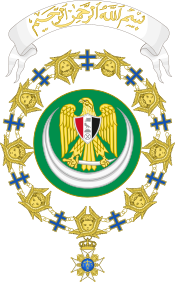
Mubarak received many awards and honors from Egypt and other countries.
From Egypt
 Grand Cordon of the Order of the Republic
Grand Cordon of the Order of the Republic Grand Cordon of the Order of the Nile, 1st class
Grand Cordon of the Order of the Nile, 1st class Recipient of the Order of the Sinai Star
Recipient of the Order of the Sinai Star Honor Star Medal, twice
Honor Star Medal, twice Military Training Medal
Military Training Medal
From Other Countries
 Brunei:
Brunei:
 Bulgaria:
Bulgaria:
 Central African Republic:
Central African Republic:
 Democratic Republic of Congo:
Democratic Republic of Congo:
 Grand Officer of the National Order of the Leopard (Zaire)
Grand Officer of the National Order of the Leopard (Zaire)
 Denmark:
Denmark:
 Knight of the Order of the Elephant
Knight of the Order of the Elephant
 France:
France:
 Grand Cross of the Legion of Honour
Grand Cross of the Legion of Honour
 Germany:
Germany:
 Grand Cross of the Order of Merit of the Federal Republic of Germany
Grand Cross of the Order of Merit of the Federal Republic of Germany
 Greece:
Greece:
 India:
India:
 Indonesia:
Indonesia:
 Pahlavi dynasty:
Pahlavi dynasty:
 Recipient of the Order of Zolfaghar, 1st class
Recipient of the Order of Zolfaghar, 1st class Hamayon Merit from Emperor Muhammad Reza Pahlavi, Iran
Hamayon Merit from Emperor Muhammad Reza Pahlavi, Iran
 Italy:
Italy:
 Knight Grand Cross of the Order of Merit of the Italian Republic
Knight Grand Cross of the Order of Merit of the Italian Republic
 Japan:
Japan:
 Kazakhstan:
Kazakhstan:
 Kuwait:
Kuwait:
 Mali:
Mali:
 Mexico:
Mexico:
 Grand Cross of the Order of the Aztec Eagle
Grand Cross of the Order of the Aztec Eagle
 Nepal:
Nepal:
 Niger:
Niger:
 North Korea:
North Korea:
 Oman:
Oman:
 Palestine:
Palestine:
 Honor Star Medal from the PLO
Honor Star Medal from the PLO
 Poland:
Poland:
 Portugal:
Portugal:
 Grand Collar of the Order of Infante Dom Henrique
Grand Collar of the Order of Infante Dom Henrique
 Saudi Arabia:
Saudi Arabia:
 Recipient of the Order of King Abdulaziz, 1st class
Recipient of the Order of King Abdulaziz, 1st class Recipient of the Order of King Abdulaziz, 2nd class
Recipient of the Order of King Abdulaziz, 2nd class Excellent Degree from King Faisal
Excellent Degree from King Faisal
 South Africa:
South Africa:
 Spain:
Spain:
 Knight of the Collar of Order of Isabella the Catholic
Knight of the Collar of Order of Isabella the Catholic
 Sudan:
Sudan:
 Sweden:
Sweden:
 Knight of the Royal Order of the Seraphim
Knight of the Royal Order of the Seraphim
 Syria:
Syria:
 Member First Class of the Order of the Umayyads
Member First Class of the Order of the Umayyads Military Honor Medal Knight Rank from the President of Syria
Military Honor Medal Knight Rank from the President of Syria
 Tunisia:
Tunisia:
 Turkey:
Turkey:
 United Kingdom:
United Kingdom:
 Honorary Knight Grand Cross of the Order of St Michael and St George
Honorary Knight Grand Cross of the Order of St Michael and St George
Images for kids
See also
 In Spanish: Hosni Mubarak para niños
In Spanish: Hosni Mubarak para niños
 | Lonnie Johnson |
 | Granville Woods |
 | Lewis Howard Latimer |
 | James West |


